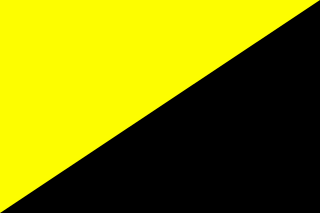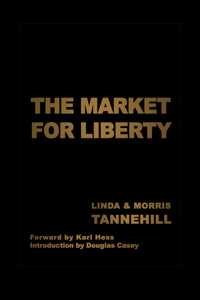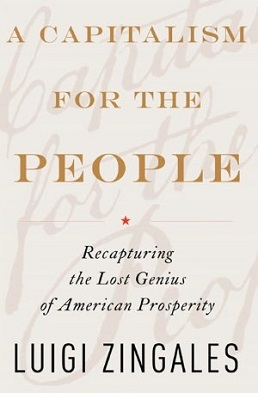
Anarcho-capitalism is an anti-statist, libertarian political philosophy and economic theory that seeks to abolish centralized states in favor of stateless societies with systems of private property enforced by private agencies, based on concepts such as the non-aggression principle, free markets and self-ownership. Anarcho-capitalist philosophy extends the concept of ownership to include control of private property as part of the self, and, in some cases, control of other people as private property. In the absence of statute, anarcho-capitalists hold that society tends to contractually self-regulate and civilize through participation in the free market, which they describe as a voluntary society involving the voluntary exchange of goods and services. In a theoretical anarcho-capitalist society the system of private property would still exist, as it would be enforced by private defense agencies and/or insurance companies that were selected by property owners, whose ownership rights or claims would be enforced by private defence agencies and/or insurance companies. These agencies or companies would operate competitively in a market and fulfill the roles of courts and the police, similar to a state apparatus. Some anarcho-capitalist authors have argued that slavery is compatible with anarcho-capitalist ideals.
Capitalism is an economic system based on the private ownership of the means of production and their operation for profit. Central characteristics of capitalism include capital accumulation, competitive markets, price systems, private property, property rights recognition, voluntary exchange, and wage labor. In a market economy, decision-making and investments are determined by owners of wealth, property, or ability to maneuver capital or production ability in capital and financial markets—whereas prices and the distribution of goods and services are mainly determined by competition in goods and services markets.
In economics, a free market is an economic system in which the prices of goods and services are determined by supply and demand expressed by sellers and buyers. Such markets, as modeled, operate without the intervention of government or any other external authority. Proponents of the free market as a normative ideal contrast it with a regulated market, in which a government intervenes in supply and demand by means of various methods such as taxes or regulations. In an idealized free market economy, prices for goods and services are set solely by the bids and offers of the participants.
State capitalism is an economic system in which the state undertakes business and commercial economic activity and where the means of production are nationalized as state-owned enterprises. The definition can also include the state dominance of corporatized government agencies or of public companies in which the state has controlling shares.

Anti-capitalism is a political ideology and movement encompassing a variety of attitudes and ideas that oppose capitalism. In this sense, anti-capitalists are those who wish to replace capitalism with another type of economic system, such as socialism or communism.

A market economy is an economic system in which the decisions regarding investment, production and distribution to the consumers are guided by the price signals created by the forces of supply and demand. The major characteristic of a market economy is the existence of factor markets that play a dominant role in the allocation of capital and the factors of production.
A mixed economy is an economic system that accepts both private businesses and nationalized government services, like public utilities, safety, military, welfare, and education. A mixed economy also promotes some form of regulation to protect the public, the environment, or the interests of the state.
Democratic capitalism, also referred to as market democracy, is a political and economic system. It integrates resource allocation by marginal productivity, with policies of resource allocation by social entitlement. The policies which characterise the system are enacted by democratic governments.
Eco-capitalism, also known as environmental capitalism or (sometimes) green capitalism, is the view that capital exists in nature as "natural capital" on which all wealth depends. Therefore, governments should use market-based policy-instruments to resolve environmental problems.
The nature of capitalism is criticized by left-wing anarchists, who reject hierarchy and advocate stateless societies based on non-hierarchical voluntary associations. Anarchism is generally defined as the libertarian philosophy which holds the state to be undesirable, unnecessary and harmful as well as opposing authoritarianism, illegitimate authority and hierarchical organization in the conduct of human relations. Capitalism is generally considered by scholars to be an economic system that includes private ownership of the means of production, creation of goods or services for profit or income, the accumulation of capital, competitive markets, voluntary exchange and wage labor, which have generally been opposed by most anarchists historically. Since capitalism is variously defined by sources and there is no general consensus among scholars on the definition nor on how the term should be used as a historical category, the designation is applied to a variety of historical cases, varying in time, geography, politics and culture.

Criticism of capitalism is a critique of political economy that involves the rejection of, or dissatisfaction with the economic system of capitalism and its outcomes. Criticisms typically range from expressing disagreement with particular aspects or outcomes of capitalism to rejecting the principles of the capitalist system in its entirety.
Right-libertarianism, also known as libertarian capitalism, or right-wing libertarianism, is a libertarian political philosophy that supports capitalist property rights and defends market distribution of natural resources and private property. The term right-libertarianism is used to distinguish this class of views on the nature of property and capital from left-libertarianism, a type of libertarianism that combines self-ownership with an egalitarian approach to property and income. In contrast to socialist libertarianism, right-libertarianism supports free-market capitalism. Like most forms of libertarianism, it supports civil liberties, especially natural law, negative rights, the non-aggression principle, and a major reversal of the modern welfare state.

The Market for Liberty is a significant anarcho-capitalist book written by Linda and Morris Tannehill. It was preceded by the self-published Liberty via the Market in 1969. The work challenges statutory law and advocates natural law as the basis for society. It also argues that society would not be lawless in the absence of the state. The Market for Liberty spends a great deal of time outlining how different businesses and organizational structures would interact in a laissez-faire society and how these interactions would create checks which would ultimately keep the tendency for crime low. In keeping with radical free-market principles, the book is skeptical about the potential for violent anarcho-capitalist revolution to bring about good outcomes.
Inclusive capitalism is a theoretical concept and policy movement that seeks to address the growing income and wealth inequality within Western capitalism following the financial crisis of 2007–2008.

A Capitalism for the People: Recapturing the Lost Genius of American Prosperity is a non-fiction book by the Italian writer and economist Luigi Zingales, who is known for serving as a Professor of Entrepreneurship and Finance at the University of Chicago's Booth School of Business. Zingales also authored the book Saving Capitalism from the Capitalists, released in 2003.
Capitalist propaganda is promotion of capitalism, often via mass media, education, or other institutions, primarily by the ruling private and political elite. According to critics of capitalism capitalist propaganda is commonly deployed in capitalist countries to maintain the cultural hegemony of capitalism, by positioning it as the supreme and only valid system, eliminating opposing and dissenting views, and portraying non-capitalist perspectives and countries as comparatively incompetent and inferior, thus reinforcing capitalism as the dominant ideology.
Economic democracy is a socioeconomic philosophy that proposes to shift ownership and decision-making power from corporate shareholders and corporate managers to a larger group of public stakeholders that includes workers, consumers, suppliers, communities and the broader public. No single definition or approach encompasses economic democracy, but most proponents claim that modern property relations externalize costs, subordinate the general well-being to private profit and deny the polity a democratic voice in economic policy decisions. In addition to these moral concerns, economic democracy makes practical claims, such as that it can compensate for capitalism's inherent effective demand gap.
Technoliberalism is a political philosophy founded on ideas of liberty, individuality, responsibility, decentralization, and self-awareness. It also highlights an idea that technology should be available to everyone with minimal controls. Its core beliefs fit under five main interests that include Construction of the Government, Economics, Civil Liberties, Education and Science, and Environment. Technoliberals support such ideas as balance of powers in the government, decentralization, affordable education, the protection of our planet, Fine Arts, and the freedom of speech and communication technologies.
Sustainable capitalism is a conceptual form of capitalism based upon sustainable practices that seek to preserve humanity and the planet, while reducing externalities and bearing a resemblance of capitalist economic policy. A capitalistic economy must expand to survive and find new markets to support this expansion. Capitalist systems are often destructive to the environment as well as certain individuals without access to proper representation. However, sustainability provides quite the opposite; it implies not only a continuation, but a replenishing of resources. Sustainability is often thought of to be related to environmentalism, and sustainable capitalism applies sustainable principles to economic governance and social aspects of capitalism as well.
Authoritarian capitalism, or illiberal capitalism, is an economic system in which a capitalist market economy exists alongside an authoritarian government. Related to and overlapping with state capitalism, a system in which the state undertakes commercial activity, authoritarian capitalism combines private property and the functioning of market forces with repression of dissent, restrictions on freedom of speech and either a lack of elections or an electoral system with a single dominant political party.






